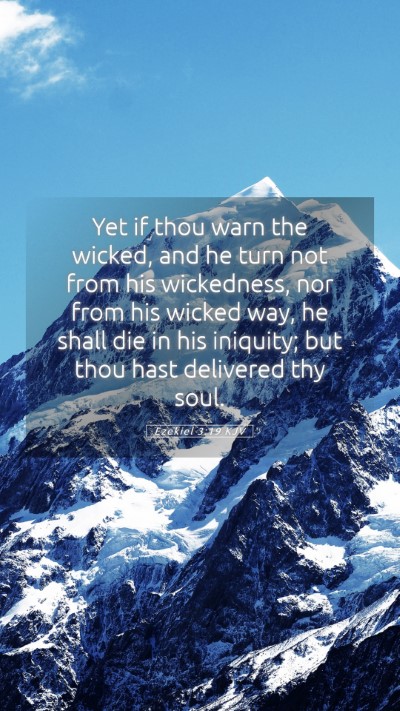Ezekiel 3:19: Understanding the Call to Warning
Ezekiel 3:19 states: "Yet if you warn the wicked, and he does not turn from his wickedness, nor from his wicked way, he shall die in his iniquity; but you have delivered your soul."
This verse embodies critical themes found throughout the prophetic literature of the Old Testament, emphasizing the role of the prophet as a warning voice to the people of Israel. The meaning of this Bible verse can be gleaned through various commentaries, offering rich insights into its application and significance.
Bible Verse Meanings and Interpretations
Ezekiel was called to be a watchman for Israel, tasked with the solemn responsibility of alerting them to their spiritual dangers. According to Matthew Henry's Commentary, the verse underscores the gravity of the watchman's duty, as failing to warn those in danger leads to personal accountability. Ezekiel's role wasn’t just a passive observation, but an active engagement in the spiritual welfare of his people.
Albert Barnes emphasizes that the wicked's refusal to heed the warnings does not diminish the importance of delivering the message. The prophet's job is to faithfully declare God's warnings, regardless of the people's response. The ultimate consequence rests with the individual who chooses to ignore the call to repentance.
In the perspective of Adam Clarke, there is clear instruction that the prophet, by delivering the message, has fulfilled his duty. Should the wicked perish without heeding that warning, the responsibility is on them, as the watchman stands innocent. This illustrates the profound tension between divine sovereignty and human agency, presenting a model for understanding Scripture where accountability is paramount.
Scriptural Context and Theological Implications
To fully grasp the implications of Ezekiel 3:19, it is essential to consider its context within the broader narrative of Ezekiel. The prophet is sent during a time of great turmoil and moral corruption among Israel. This warning to the wicked reveals God's desire for repentance and His unwillingness to see any perish.
- Prophetic responsibility: The emphasis on the watchman's role illustrates the communal nature of salvation and accountability.
- Personal accountability: Each individual is responsible for responding to God's call to repentance; the watchman merely relays the message.
- Divine mercy and justice: This verse reflects the tension of God’s patience with iniquity while holding individuals accountable for their choices.
Application and Relevance Today
The significance of this verse extends beyond its historical context into contemporary Christian life. Believers are called to be ambassadors of God’s truth, engaging in discussions that warn about spiritual dangers. Understanding Scripture in light of Ezekiel 3:19 challenges individuals within Bible study groups to reflect on their own responsibilities within their communities.
Furthermore, Bible Study Insights gleaned from this verse encourage an understanding that faith inherently includes proclamation. How often do individuals neglect the call to warn others of moral and spiritual dangers? Applying the teachings from this scripture to daily life may prompt believers to take an active role in evangelism and discipleship.
Cross References
- Ezekiel 33:7-9: Clarifies the watchman's duty and emphasizes the urgency of warning the wicked.
- 2 Peter 3:9: Illustrates God’s desire for repentance and His patience toward mankind.
- Matthew 28:19-20: The Great Commission underscores the call for believers to spread God’s message actively.
Conclusion
In summary, Ezekiel 3:19 profoundly illustrates the responsibilities of those called to communicate God’s warnings to others. Understanding this scripture deepens our commitment to understanding our own roles as messengers, imparting clarity on the significance of accountability in faith. As individuals study the Bible, this verse serves as a critical point of reflection regarding personal responsibility toward God and others.


